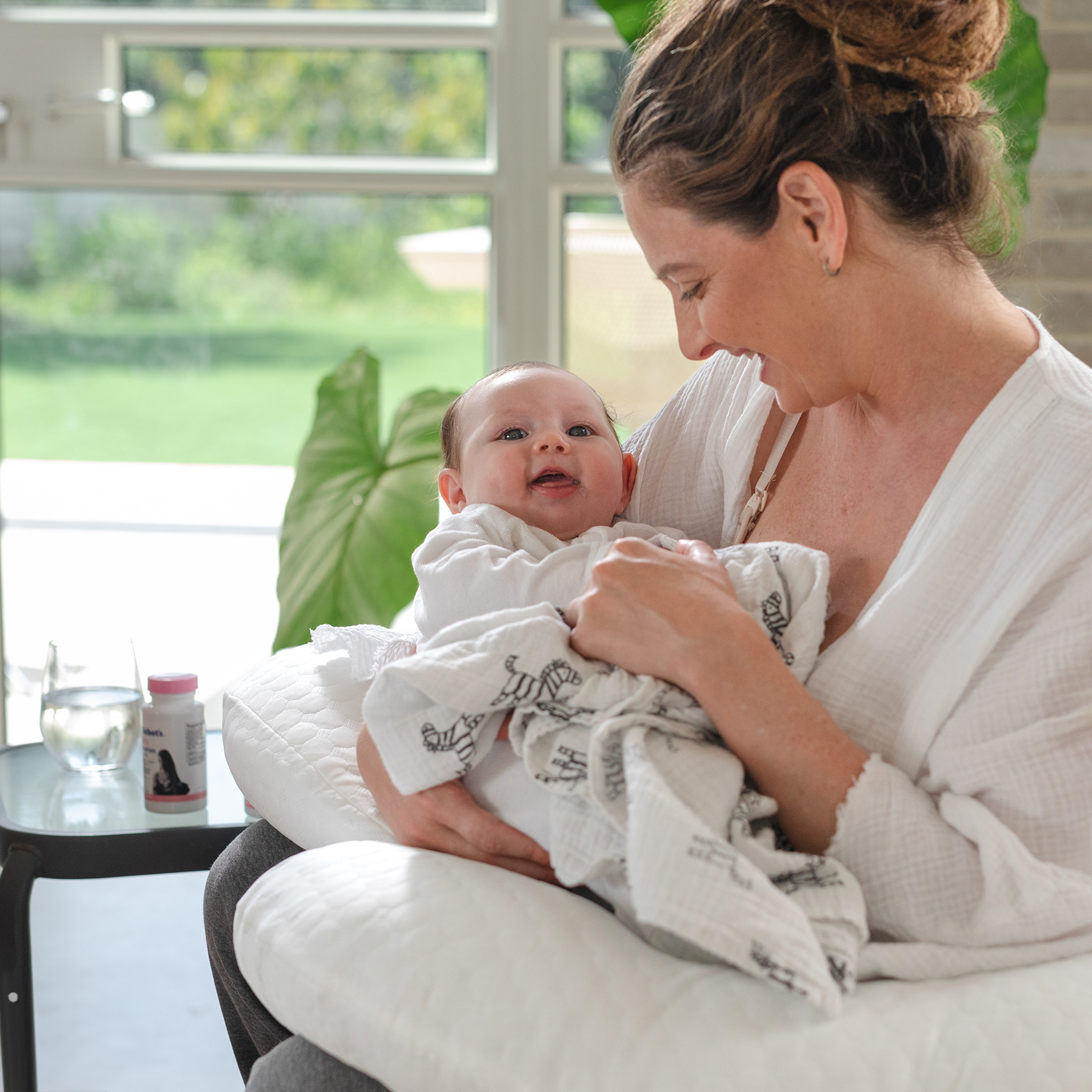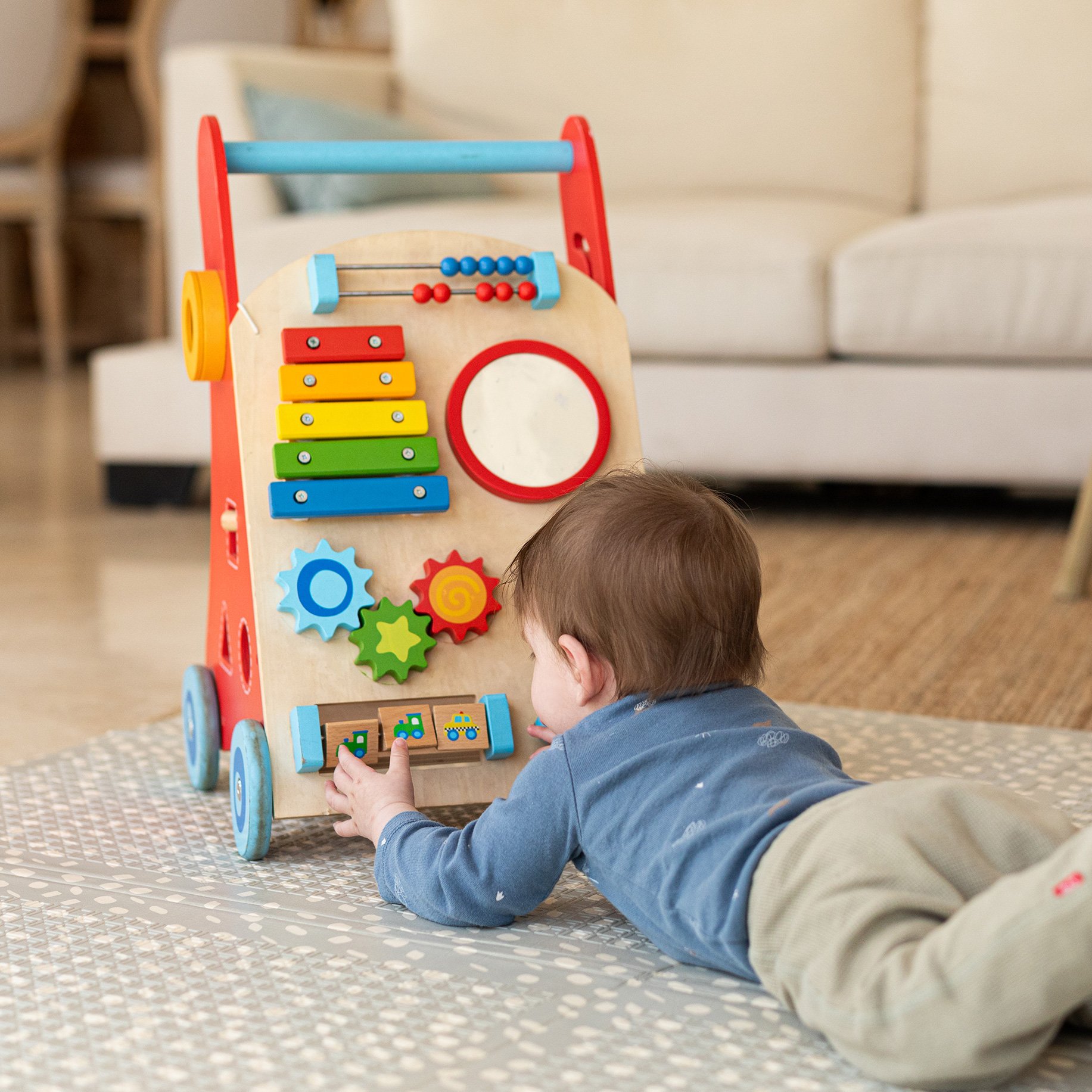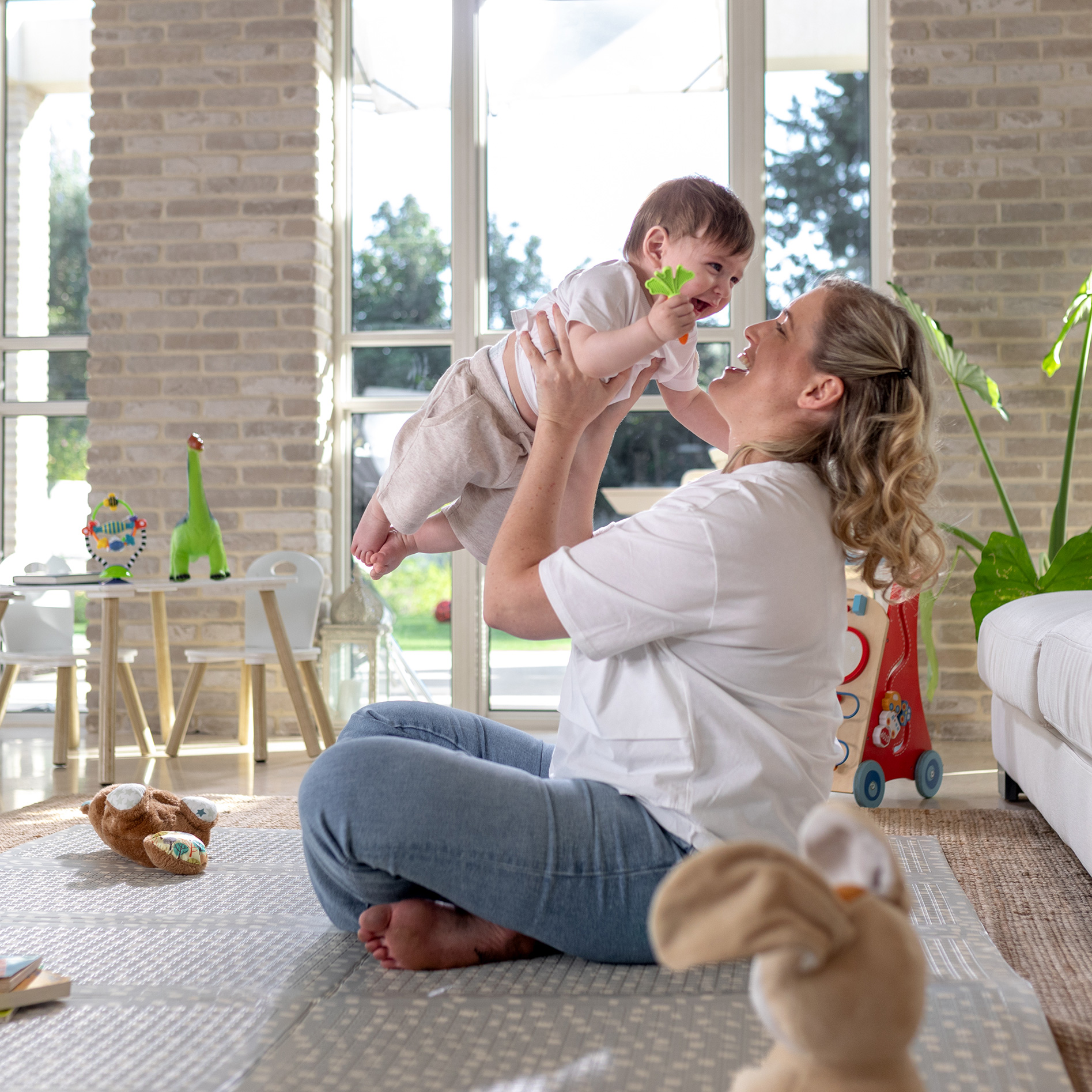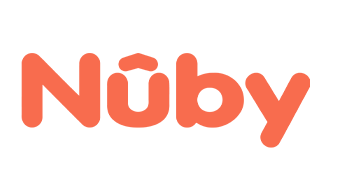As parents, witnessing your baby's development during their first year is both exciting and fulfilling.
From their earliest laugh to those first steps, every milestone is a testament to their growth and progress.
Take time to learn what to expect from your little one during those first twelve months. This will help you better prepare your child (and yourself) for their next step on the journey of life.

What types of skills will my baby develop in their first year?
Before we talk timelines, let's explore the broader spectrum of developmental milestones of baby's first year.
Social & Emotional Development: Smiles and displays of affection. Babies develop strong emotional bonds with caregivers and begin to understand social cues.
Language & Communication: Babbling, responding to voices, and even their first words are part of baby's language development journey.
Cognitive Skills: These include recognizing familiar faces and objects, problem-solving, and understanding cause and effect.
Gross Motor Skills: Includes rolling over, sitting up, crawling, and eventually walking. These skills focus on strengthening muscles and coordination.
Fine Motor Skills: Fine motor skills help your baby interact with objects and explore the world with their hands. They include grabbing objects and developing the pincer grasp.
With that out of the way, here are the most significant developmental milestones parents can expect to see in year one.

What are the most significant first year milestones?
A lot happens in the first year of a baby's development. The path from newborn to toddler is paved with sleepless nights, teething pains, and plenty of tumbles along the way. Of course, it's all for the greater good, as your baby is learning that there's literally a first time for everything.
With so much growing to do, here are some of the key milestones you'll expect to see during the first twelve months.
Keep in mind: Every baby is different. These milestones are only guidelines. That said, if you're ever concerned about your child's developmental progress, consult their pediatrician right away.
1 Month: Focus & Respond!
During the first month, your newborn is adjusting to life outside the womb. They should begin to respond to sounds and focus on objects close to their face.
Baby rattles are great for newborns because they stimulate their senses with sound and color. They'll also help develop motor skills through grasping and shaking. Likewise, the rattling sound provides entertainment and can be soothing. This makes rattles versatile toys for early development.
3 Months: Bring On The Smiles !
By the third month, your baby's head control will improve. In fact, they may start to lift their head briefly while lying on their stomach in an activity known as “tummy time.”
Tummy time is highly recommended by doctors, the NIH, and other healthcare institutions. It helps infants build up their neck and shoulder muscles. Regular tummy time will help your child develop the ability to lift their head on their own without you.
Enhance tummy time adventures with a high-quality nursing pillow and floor playmat. Creating a soft, safe environment where you can monitor your child is key when it comes to early activities.
In addition to better head and neck control, you may also notice them beginning to coo and smile in response to stimuli.
6 Months: Teething, Sitting & Babbling!
By six months, with increased curiosity of visual objects and colors, many babies are developing their senses. They can roll over in both directions and may start to sit up with support. They might also begin babbling and responding to their name.
As their parent, encourage and offer plenty of opportunities for exploration through colorful baby toys and safe environments.
Your baby has also started growing their first few incisors and teething (though this sometimes starts as early as month three).
Teething can be tough. That's why it's important to have a collection of baby-safe teething toys to help sooth your child as they work through it.
If you want a toy that helps with teething pain and stimulates baby's senses, try the Twista Rattle Teether Toy. It's a popular choice that many parents love.
9 Months: Explore & Play!
By nine months, your baby may be able to sit unsupported and may even start to crawl. They may also develop a pincer grasp, allowing them to pick up small objects. In many cases, your baby will start holding onto furniture to pull themselves up.
Bath time will be a lot more exciting for baby around this time. They'll love splashing and playing with toys like these Whale Stacking Bath Cups. It's a great opportunity to help your child explore and further develop their grabbing and gripping skills.
12 Months: Unsupported Standing, First Steps & Even Simple Words!
At one year, your baby may take their first steps or stand briefly without support. They may even begin mimicking simple gestures and words!
Celebrate their achievements and provide encouragement as they navigate this exciting stage of independence.
Empower your little explorer with this Wooden Baby Walker! From fostering creativity with the xylophone to honing problem-solving skills with the shape sorter, it's the perfect way to make learning fun.

What are the most common questions about a baby's first year?
Now, let's address some common questions parents may have about first year baby milestones.
What should I do if my baby misses one of these milestones?
Don't panic! Babies all develop at their own pace.
A few missed milestones here or there are nothing to fret over. In fact, you may find your child reaching some milestones sooner while reaching others later.
If your child seems to be lagging on any key milestones, gently focus activities on those milestones as part of your routine.
For example, if your baby isn't responding to their name by six months, use it more often during games like peek-a-boo. You can even make a point of saying it more during your interactions.
Talk with your child's doctor about your baby's progress. Keep track of your concerns as you have them on a notepad or even within a note-taking app on your phone. If their pediatrician sees any reason for concern, they may recommend a screening or assessment to evaluate your child's progress.
If your baby is experiencing developmental delays, the doctor might recommend early intervention services. These services support infants and toddlers with developmental delays or disabilities. They can include therapies such as speech therapy or physical therapy.
What warning signs should I watch for when monitoring my baby's development?
If your baby isn't gaining weight or has issues with feeding, talk to your baby's doctor right away.
Your child should begin to respond to sounds and visual stimuli early in development. If you think your baby isn't showing interest in surroundings or people, again, let their doctor know.
At some point during the first year, usually by month three, your baby should be making eye contact with people. Cooing and other vocalizations are also common by this time.
Finally, watch for a lack of social smiles by the third month. Other signs you should bring up with your child's doctor include a lack of interest in caregivers, excessive crying, and prolonged difficulty soothing your child.
What can I do to help my baby reach these milestones faster?
The best thing you can do to support your baby's development is to engage and play with them – not a bad deal!
By providing a nurturing and stimulating environment at home, you'll naturally support their development. Doing things like reading, playing, and exploring with your child can help them grow and develop faster. It's also a good way to bond with them.
Stay informed about typical developmental milestones for babies and stay involved in your baby's care and development. Attend appointments, follow recommendations from healthcare providers, and ask questions if you have concerns.
Most of all, be there for your child. There's no need to race through milestones. Your child will reach them at their own pace. Play, have fun, and maybe do your best to get a little sleep.



